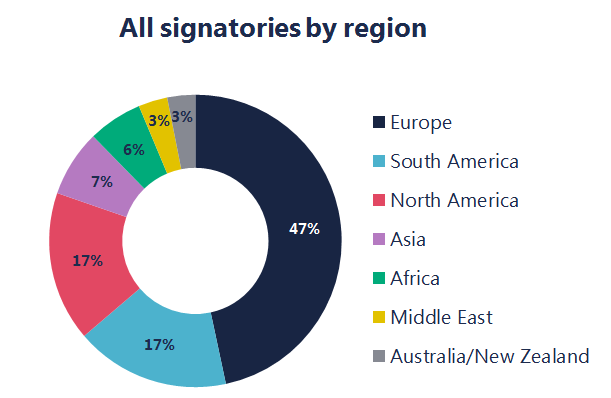By Natalie Sheehan and Ashley Jones
The Equal Representation in Arbitration Pledge (the Pledge) is celebrating reaching a milestone 3,000 signatories, just over two years since its launch in May 2016. This is an incredible achievement for the Pledge, which was conceived as a call to action to address the historical under-representation of women in international arbitration, particularly those sitting as arbitrators.
The Pledge has two objectives. First, it aims to improve the profile and representation of women in international arbitration. Second, it seeks the appointment of women as arbitrators on an equal opportunity basis. The Pledge recognises that, while there are many well-qualified women arbitrator candidates, they often lack visibility, with arbitrators frequently appointed from a relatively small pool of mostly male arbitrators. This lack of diversity raises questions as to the legitimacy of the arbitral process, unconscious bias and conflicts of interest, as well as procedural inefficiencies, including delays in the rendering of arbitral awards due to the limited availability of arbitrators.
Who are the 3,000 signatories?

Of the organisations that have signed up to the Pledge, three quarters are law firms and barristers’ chambers. Just under a quarter are arbitral institutions, including centres with large international caseloads such as the ICC, LCIA, SCC, HKIAC and SIAC, as well as regional centres including the Cairo Regional Centre for International Commercial Arbitration, Comitê Brasileiro de Arbitragem, Comisión Interamericana de Arbitraje Comercial and Lagos Chamber of Arbitration. 4% of organisation signatories comprise corporates that are frequent users of arbitration, including BP, ConocoPhillips, GE, Repsol and Shell. The remaining organisations comprise expert consultancies, third-party funders, government departments and law schools.

Three quarters of individual signatories are lawyers at law firms, barristers’ chambers, arbitral institutions and third party funders. 10% of individual signatories are arbitrators and judges, with a further 10% academics and 5% are experts and representatives of corporates.

In terms of regional spread, just under half of all signatories (both individuals and organisations combined) are drawn from Europe, with 17% from South America, 17% from the North America, 7% from Asia and 6% from Africa. This broadly reflects the composition of the Pledge Steering Committee, comprised of 56 members from 27 jurisdictions, representing law firms (65%), arbitral institutions (30%) and corporates (5%), co-chaired by Pledge founder and Freshfields’ partner Sylvia Noury, and Wendy Miles QC.
The Pledge has had particularly strong support in Latin America, driven by a sub-committee chaired by Freshfields’ partner Noiana Marigo, with 36 representatives in 20 jurisdictions having organised or participated in over 20 events in the last two years to raise awareness of the Pledge and push for progress.
What has the Pledge achieved with the help of these signatories?
Since its launch in 2016, the Pledge has evolved rapidly from a proposal to effect change to an award-winning global campaign that has put the issue of gender equality firmly on the agenda for the international arbitration community, and opened a wider debate on diversity in the profession.
Many arbitral institutions now publish statistics on the appointment of female arbitrators, which serve as an important measure of progress. Both institutions and parties are taking active steps to appoint women to tribunals. Several arbitral institutions have adopted policies addressing diversity in their arbitrator appointments. For example, in 2017 the SCC published a policy paper on arbitrator appointments, stating that ‘the SCC seeks to foster diversity in all appointments’. The Board of the Swiss Arbitration Association added gender as a criterion in its arbitrator search tool. More anecdotally, all-male tribunals and all-male panels (or ‘manels’) at arbitration conferences are no longer seen as acceptable and parties are taking steps to appoint gender-balanced tribunals and panels.

The available data on appointments of arbitrators indicates that progress is being made. In 2015, prior to the Pledge’s launch, women were estimated to comprise approximately 10% of arbitrator appointments (by parties and institutions combined) at the major arbitral institutions. By 2017, the average number of female arbitrators appointed across those institutions had risen to 18%. For example, the LCIA reported an increase from 16% to 24% from 2015-2017, while the ICC reported an increase from 10% to 16.7% in the same period. ICSID’s recently published Annual Report 2018 revealed that in the financial year to April 2018, 24% of all the arbitral appointments in ICSID cases were women, a significant increase from 14% in the previous year.
The Future
Notwithstanding the progress made, there is more to be done. The Pledge Steering Committee continues to seek to raise awareness of the Pledge and to implement its aims, but relies on the continued, active support of all signatories. The Pledge’s Resolutions for 2018 set out concrete steps for signatories to take to implement change on day-to-day basis, including using the Pledge’s female arbitrator search tool when preparing lists of arbitrator candidates, organising conference panels with a fair representation of women speakers and sponsoring or mentoring female colleagues. Acting together, these individual actions can effect tangible change, making the Pledge’s ultimate goal of gender parity a reality.




/Passle/5832ca6d3d94760e8057a1b6/MediaLibrary/Images/2024-12-19-08-27-41-006-6763d8fdda543fe5c20b0fae.png)